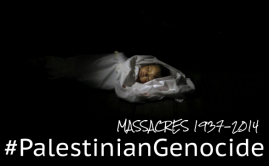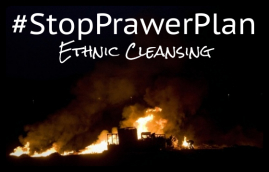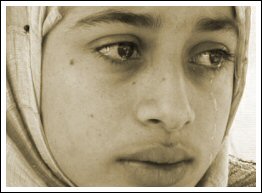“Settling” constitutes a warcime according to international law and ICC statute. Even under US’ own military legislations’
Law resources below this article
[ PIC 27/02/2013 – 09:42 PM ]
Follow @palinfoen Follow @palinfoar
![images_News_2013_02_27_red-indians_300_0[1]](https://occupiedpalestine.files.wordpress.com/2013/02/images_news_2013_02_27_red-indians_300_01.jpg?w=588)
NAZARETH, (PIC)– Jewish Agency concerned with attracting Jews of the world to live in Palestinian occupied lands has been facilitating the arrival of group of American Indians, living on the banks of the Amazon River, claiming they have Jewish origin.
Hebrew media revealed that a group of 100 American Indians, who are currently living in the city of Iquitos located on the banks of the Amazon River, are expected to arrive to the occupied territories.
According to Israeli media claims; these people are part of a “unique” Jewish community, originated from the late nineteenth century when a group of Jews migrated from the Maghreb, and settled in this town, located in the jungles of the Amazon basin, where they worked in rubber trade – as alleged by the Hebrew source.
It said that decades ago members of this community have contacted Jewish religious organizations, which worked hard to bring them to the occupied territories. The first group of them arrived in the nineties, followed by another group. Then, 12 years ago, another group of 250 American Indians, arrived. Recently, 100 other people demanded to come to the entity.
An official at the Jewish Agency said that the members of this group hold documents that confirm their Jewish origin, adding that the agency has already approved their arrival but the Israeli Interior Ministry has required additional “complementary” measures.
The new group may come to the occupied territories very soon, after the completion of the procedures.
![]()
LAW
“States may not deport or transfer parts of their own civilian population into a territory they occupy.”
Summary
State practice establishes this rule as a norm of customary international law applicable in international armed conflicts.
International armed conflicts
The prohibition on deporting or transferring parts of a State’s own civilian population into the territory it occupies is set forth in the Fourth Geneva Convention.[1]
It is a grave breach of Additional Protocol I.[2]
Under the Statute of the International Criminal Court, “the transfer, directly or indirectly, by the Occupying Power of parts of its own civilian population into the territory it occupies” constitutes a war crime in international armed conflicts.[3]
Many military manuals prohibit the deportation or transfer by a party to the conflict of parts of its civilian population into the territory it occupies.[4]
This rule is included in the legislation of numerous States.[5]
Official statements and reported practice also support the prohibition on transferring one’s own civilian population into occupied territory.[6]
Attempts to alter the demographic composition of an occupied territory have been condemned by the UN Security Council.[7]
In 1992, it called for the cessation of attempts to change the ethnic composition of the population, anywhere in the former Yugoslavia.[8]
Similarly, the UN General Assembly and UN Commission on Human Rights have condemned settlement practices.[9]
According to the final report of the UN Special Rapporteur on the Human Rights Dimensions of Population Transfer, including the Implantation of Settlers and Settlements, “the implantation of settlers” is unlawful and engages State responsibility and the criminal responsibility of individuals.[10]
In 1981, the 24th International Conference of the Red Cross reaffirmed that “settlements in occupied territory are incompatible with article 27 and 49 of the Fourth Geneva Convention”.[11]
In the Case of the Major War Criminals in 1946, the International Military Tribunal at Nuremberg found two of the accused guilty of attempting the “Germanization” of occupied territories.[12]
References
[1] Fourth Geneva Convention, Article 49, sixth paragraph (cited in Vol. II, Ch. 38, § 334).
[2] Additional Protocol I, Article 85(4)(a) (adopted by consensus) (ibid., § 335).
[3] ICC Statute, Article 8(2)(b)(viii) (ibid., § 336).
[4] See, e.g., the military manuals of Argentina (ibid., §§ 346–347), Australia (ibid., § 348), Canada (ibid., § 349), Croatia (ibid., § 350), Hungary (ibid., § 351), Italy (ibid., § 352), Netherlands (ibid., § 353), New Zealand (ibid., § 354), Spain (ibid., § 355), Sweden (ibid., § 357), Switzerland (ibid., § 357), United Kingdom (ibid., § 358) and United States (ibid., § 359).
[5] See, e.g., the legislation of Armenia (ibid., § 361), Australia (ibid., §§ 362–363), Azerbaijan (ibid., §§ 364–365), Bangladesh (ibid., § 366), Belarus (ibid., § 367), Belgium (ibid., § 368), Bosnia and Herzegovina (ibid., § 369), Canada (ibid., §§ 371–372), Congo (ibid., § 373), Cook Islands (ibid., § 374), Croatia (ibid., § 375), Cyprus (ibid., § 376), Czech Republic (ibid., § 377), Germany (ibid., § 379), Georgia (ibid., § 380), Ireland (ibid., § 381), Mali (ibid., § 384), Republic of Moldova (ibid., § 385), Netherlands (ibid., § 386), New Zealand (ibid., §§ 387–388), Niger (ibid., § 390), Norway (ibid., § 391), Slovakia (ibid., § 392), Slovenia (ibid., § 393), Spain (ibid., § 394), Tajikistan (ibid., § 395), United Kingdom (ibid., §§ 397–398), Yugoslavia (ibid., § 399) and Zimbabwe (ibid., § 400); see also the draft legislation of Argentina (ibid., § 360), Burundi (ibid., § 370), Jordan (ibid., § 382), Lebanon (ibid., § 383) and Trinidad and Tobago (ibid., § 396).
[6] See, e.g., the statements of Kuwait (ibid., § 405) and United States (ibid., §§ 406–407) and the reported practice of Egypt (ibid., § 402) and France (ibid., § 403).
[7] See, e.g., UN Security Council, Res. 446 , 452 and 476 (ibid., § 408), Res. 465 (ibid., § 409) and Res. 677 (ibid., § 410).
[8] UN Security Council, Res. 752 (ibid., § 411).
[9] See, e.g., UN General Assembly, Res. 36/147 C, 37/88 C, 38/79 D, 39/95 D and 40/161 D (ibid., § 412) and Res. 54/78 (ibid., § 405); UN Commission on Human Rights, Res. 2001/7 (ibid., § 413).
[10] UN Sub-Commission on Human Rights, Final report of the Special Rapporteur on the Human Rights Dimensions of Population Transfer, including the Implantation of Settlers and Settlements (ibid., § 415).
[11] 24th International Conference of the Red Cross, Res. III (ibid., § 419).
[12] International Military Tribunal at Nuremberg, Case of the Major War Criminals, Judgement (ibid., § 421).

 February 27, 2013
February 27, 2013 
 Still live in fairy-tale-land about Israel? Time to wake up: The Map of the “Greater Israel” even is hammered on the currency:All facts at Storify continuously updated. Read what Israeli ‘leaders’ have said and done even before (peace) talks and how their actions contradict the reality and ugly facts which they try to hide from you:
Still live in fairy-tale-land about Israel? Time to wake up: The Map of the “Greater Israel” even is hammered on the currency:All facts at Storify continuously updated. Read what Israeli ‘leaders’ have said and done even before (peace) talks and how their actions contradict the reality and ugly facts which they try to hide from you:































Comments are closed.